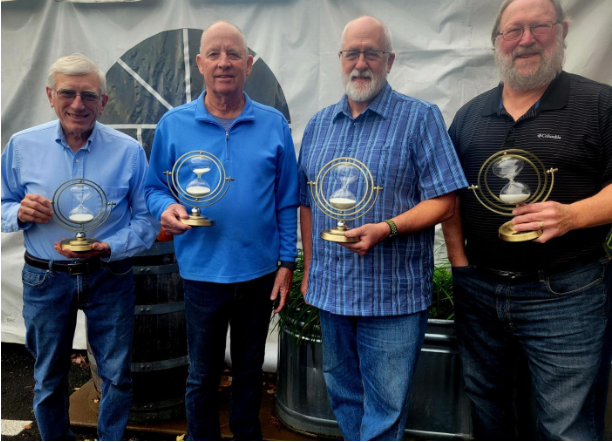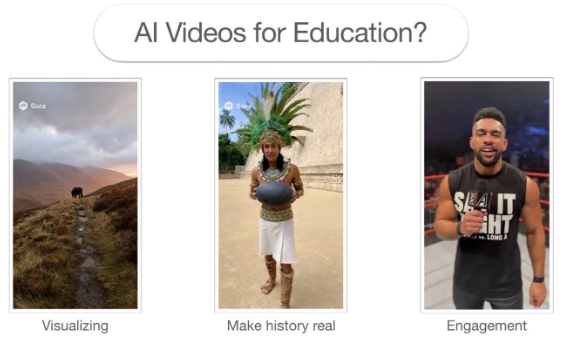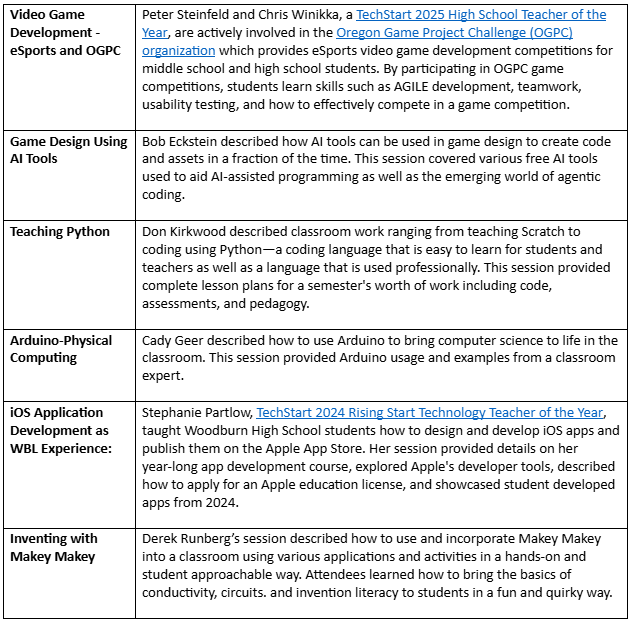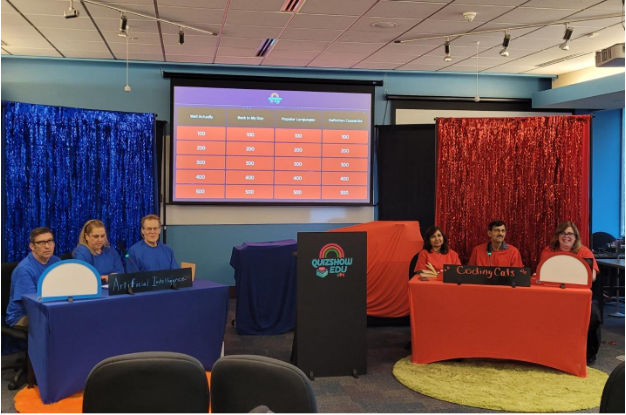AI: Empowering Educators, Guiding and Equipping Learners
By Linda Barney, Barney and Associates
The Oregon Computer Science Teachers Association (OCSTA) is an organization of teachers training teachers in Oregon since 1985. OCSTA hosts remote and on-site all-day spring and fall SuperQuest conference teacher training courses where K-12 computer science teachers share curricula information on new technologies, coursework examples, and hints on how to engage students. OCSTA held their 2025 Fall Teacher’s Conference on November 1 at the Oregon Tech campus in Wilsonville, Oregon. The onsite conference provided professional development (PD) learning opportunities for teachers in Oregon and southwest Washington teaching K-12 computer science classes. Attendees included teachers, Oregon Department of Education, and organization representatives from across Oregon, and southwest Washington including Vancouver, Longview, and Seattle.
“OCSTA is pleased with the attendance at this recent fall conference. We hosted over 80 Oregon and Washington educators and STEM professionals, more attendees than any conference since COVID. This is good news in that there is an interest in learning more about high tech teaching and OCSTA is in a position to provide the needed training.” states Terrel Smith, President OCSTA.
OCSTA Celebrates 40th Anniversary
Forty years ago, four men along with a few others, envisioned creating a community of Oregon educators who could learn from each other in this emerging world of technology. They formed the Computer Science Teachers Association and continued to meet and share experiences and ideas so that no one would be alone in adopting and teaching technology courses/computer science in Oregon. This thought seed grew and expanded and became the Global Computer Science Teachers Association (CSTA) and the original Oregon chapter was renamed the Oregon Computer Science Teachers Association (OCSTA). The Global CSTA now has 64 worldwide chapters, all with the vision of "Teachers teaching teachers."
A video was displayed at the 2025 Fall Conference where Jake Baskin, Executive Director of the Global CSTA congratulated OCSTA for being in existence for 40 years. The four OCSTA founders were honored at the OCSTA 2025 Fall Conference with awards. “You are visionaries, pioneers, and explorers, leading the way for all of us to follow the pathway you laid out. Thanks for the exceptional work and happy 40 years!” states Kathy Zettl-Schaffer, Program Director at Teach Engineering Champions Institute and Executive Board Member, OCSTA.
OCSTA founders from left to right: Don Domes, Terrel Smith, Brent Wilson, and Don Kirkwood.
Oregon Department of Education (ODE) Standards and Computer Science Plan
In this session, Jeffrey Rhoades, an ODE Arts, Information Communication Technology Education Specialist, presented information on the ODE statewide K-12 computer science implementation plans. As stated in the December 2023 long-term Computer Science Education Implementation Plan, the Oregon Governor directed the Oregon Department of Education (ODE) in collaboration with the Oregon Higher Education Coordinating Commission (HECC) to develop a statewide, long-term implementation plan to provide access to comprehensive computer science education opportunities to every public-school student in this state by the 2027-2028 school year.
Part of the plan includes the development of optional K-12 computer science standards to be released in 2026. Any person is invited to participate as a volunteer in the public review of the draft standards. The review will begin in Fall 2025. Those interested in participating in the review process can sign up through an online form which can be accessed at this website. There will also be a short and optional real-time virtual session for those who would like additional clarification of the review process.
ODE Artificial Intelligence Training Modules
The Oregon Department of Education tasked the Willamette Education Service District with producing a primer on Artificial Intelligence aimed at school district staff. The primer consists of eight modules, which can be experienced in sequence or individually, on a subject connecting Artificial Intelligence to education in Oregon. Each of these eight modules are designed to be taught in sixty-to-ninety-minute professional development blocks by a presenter. Additionally, each module contains an AI generated video guiding viewers through the session’s topic. Jacob Niebergall, along with eight other educators from across the state, had the opportunity to help edit and guide the final draft of the modules. ODE will publish these for districts to access within the next quarter.
Using AI in K-12 Computer Science Education Sessions
There are more questions than answers regarding what and how educators should teach AI in K-12 computer science classes when facing the AI future. Various sessions focused on the latest and most effective ways to harness AI for specific applications including how educators can work smarter, not harder, by using AI tools tailored to classroom needs. The What/HOW should we teach in this AI reality session with panelists Bob Eckstein, Cady Geer, Brennan Agranoff, and Brent Wilson examined the actual current curriculum content and the possible changes that could and should be implemented for student success.
Hands-On AI for Elementary School Students
Jacob Niebergall is a leader in teaching computer science and AI concepts to his elementary school students at Sunset School in Coos Bay, Oregon. He received the TechStart Technology Teacher of the Year for grades K-8 in 2024. He teaches a sixth-grade course which introduces students to Science, Technology, Engineering, Art, and Mathematics (STEAM) including innovative computer science, artificial intelligence (AI), augmented reality (AR), and virtual reality (VR) concepts. He is using a variety of AI tools in his classroom including instruction on how AI tools can be used to create videos.
One of the tools he uses is the SORA Open AI tool that requires a paid subscription to OpenAI’s OpenGPT tool. The SORA tool can be used to create a video with one prompt. “Open AI, on the vanguard of consumer generative artificial intelligence, updated its video generative AI in October. The program, called SORA 2, offers several new improvements over the first generation. This includes improved physics, a moving watermark, the ability to ‘cameo’ real people into videos, and audio. SORA 2 offers clear pitfalls for misuse but also potential imaginative opportunities for student engagement,” states Niebergall.
Educational videos created with SORA2 using a single AI prompt.
Lunch Keynote Session: Exploring the Future of AI in the Current and Future Workplace and How to Prepare Students for that Reality
In the lunch keynote, Timon Smith (son of OCSTA President, Terrel Smith) presented the lunch keynote address. Timon https://www.linkedin.com/in/timonsmith/ has extensive experience working with companies such as Apple, MS, AWS and CISCO and has analyzed trends relating to AI. Timon described the phases of AI adoption and how to help prepare K-12 computer science teachers and students for the changing future of AI and how it will affect work trends.
Timon used the 2025 Gartner Hype Cycle™ as a way to envision the cycles of how generative AI will move through various cycles from initial AI innovation trigger (0-2 years), Hype which is in the peak of inflated expectation (2-5 years), Trough of Disillusionment of early adopters (5-10 years), and Tipping Points or Slopes of Enlightenment (10+ years), and finally a Plateau of Productivity. The increased implementation of AI will have a major impact on what students need to learn and how teachers need to prepare students for a future with extensive AI implementation.
Timon indicates, “Generative AI and agentic AI will be disruptive to how jobs will be shaped at the Hype peak. There is a high chance that the majority of businesses will have adopted AI in the workforce which will affect students graduating in 2034.”
What students need to focus on to meet the challenges of AI in the evolving job market:
Core programming languages – It is important to think beyond coding. Take some time to learn tools such as Python and SQL for data every day. Data is the main source of information for AI, so students need to understand systems and data as well as learn how to access and use data.
Math and algorithm skills – Math is the basis for many algorithms, so having a strong math background is important.
AI and cloud skills – There is a massive demand for compute capabilities to run the massive amounts of data used for AI analysis and training. The compute cycle for running AI workloads uses huge amounts of power. Students need to understand Amazon Web Services (AWS) as well as other cloud frameworks and mobile skillsets.
Soft skills – Teamwork and problem-solving skills are especially important. 95% of employers require problem solving. It is important to develop strong collaborative and communication skills. Change is so fast that adaptability and continuous learning is critical.
What teachers need to focus on to meet student needs in AI in the evolving job market:
It is likely that the future will include job displacement disruption resulting in humans losing jobs to AI and automation advancements. The change may also result in a polarized economy as AI widens inequalities, especially for students with lack of AI and technologies training. What can teachers do to prepare their students for the AI future?
Teach AI and technology skills early – Introduce students to AI and technical tools early in their K-12 education.
Prepare students for multiple futures – Students may need to switch to different jobs or industries in the future. They need to have AI skills and be able to pivot with skills needed for jobs.
Develop a responsive curriculum – As AI technologies and job requirements change, provide universal AI tools to help students develop adaptable skills to prepare for changes.
Curriculum & Pedagogy Sessions
These sessions covered the foundations of Science, Technology, Engineering, and Math (STEM) learning, including how technology applications can be commonly practiced in an elementary school curriculum. Teaching K-12 computer science classes are getting harder with many classroom disruptions, student apathy, parent phone calls and increased tracking requirements. In the Burned out? Let's Rethink our Mission session, Terrel Smith challenged K-12 computer science teachers by stating, “We need to remember our mission and work on how to change our student's world without burning out. Teachers' careers need to burn bright, not burn out.” In the interactive session, teachers discussed strategies to prevent burnout.
Julie Cucuel led two sessions providing computer science curriculum help for K-12 teachers. The Teach Engineering-National Engineering Curriculum session explored computer science lessons and hands-on activities from the TeachEngineering.org curriculum. These free, standards-aligned resources integrate core computer science (CS) concepts with real-world problem solving and engineer design provided by ncwit.org. Discover easy-to-implement materials to bring engaging computer science experiences to the classroom—no prior CS experience needed. The Elementary-STEM Hub Resource Lending session introduced the statewide Oregon STEM Hub Network CS technology and equipment lending as part of regional STEM Lending Libraries.
In the Elementary STEM K-5 session, Brenda Selby described how her team at Sherwood, Oregon is teaching the STEM/high tech curriculum at the elementary level. They are giving a foundation for girls to realize they can do STEM and technology. Some of the tools used in the STEM class includes Dash/Dot, Sphero Indi, Sphero Bolt, Bloxels, Indi Garage, Math Monsters, Mars Rover Lander, Balancing Robot, Magnetic Cars, Ball Launcher, Cardboard Arcade, and Paper Circuit Cars.
Cybersecurity Sessions
Teaching cybersecurity strategies is a critical part of K-12 computer science education. Cybersecurity is a high-demand field, but few high school students have access to cybersecurity training in their school. In the College Board AP Cybersecurity Test Pilot session, Kerry Stern, Regional Director for the College AP Board provided information on an AP Cybersecurity pilot course designed for high school students. In the 2025-26 school year, schools can participate in the pilot course for AP Cybersecurity, with the course launching nationally in 2026-2027. The course will provide foundational concepts and skills students can apply to cybersecurity roles and a range of related career paths. An AP Cybersecurity Exam scheduled for 2027 will assess essential student's cybersecurity technical skills. Students who pass the exam can receive college credit and an AP Cybersecurity Credential.
University of Oregon Cybersecurity Program Supports High School Students
In the Nurturing Inclusive Cybersecurity Education at Oregon High Schools session, Dr. Reza Rejaie, professor and head of the UO Department of Computer Science described several Higher Education Coordinating Commission (HECC)-funded initiatives at the University of Oregon aimed at promoting, supporting, and expanding cybersecurity education in Oregon high schools during the 2025–2026 academic year. The UO Nurturing Inclusive Cybersecurity Education (NICE) program is a state-funded initiative that promotes and supports equitable cybersecurity education in Oregon’s high schools and postsecondary institutions. These initiatives include: 1) a teacher training workshop to prepare educators to offer a cybersecurity course, 2) high school visits by cyber educators and professionals to engage students in hands-on cybersecurity activities, 3) a free summer cyber camp for high school students, and 4) customized campus tours of the University of Oregon. Computer science teachers from high schools across Oregon can attend a UO cybersecurity workshop to learn about the RING curriculum for teaching cybersecurity in high school classrooms. Rejaie encourages teachers to make their students aware of the UO cybersecurity program and summer camps like the UO free cybersecurity UO summer camp designed to spark Oregon high school students’ interest in cybersecurity.
Game Design, Application Development, and Physical Computing Sessions
Attendees at the OCSTA Fall 2025 Conference learned techniques and tools to teach K-12 students computer science concepts and skills from other teachers.
Strategies to Make CS K-12 Education Fundamental During the Next Oregon Biennium
Andrew Cronk led a discussion about the importance of getting a K-12 computer science curriculum requirements bill approved in the Oregon legislature for 2027 since Oregon SB541 did not pass in 2025. Cronk indicates that a coalition of groups will need to work on specific requirements and be actively involved in pushing for passage of a new bill.
Career Readiness
Eric Campbell described that in choosing a degree program that it is important for both parents and students to be aware of various degree programs, how much they pay at graduation, and the earning potential later in a career. On his Archerindustries.org website, Campbell created a High-Wage, High-Demand Jobs summary page with information that can be helpful in choosing a college major.
George Fox University Proposed University Students Mentoring K-12 CS Student
Dr. Brent Wilson, George Fox University Professor of Computer Science & Cybersecurity indicates that high school students often need individual help with CS classes. He points out that individual help with a tutor is a big benefit to student learning. Wilson indicates that George Fox CS University students could be available to OCSTA to function as computer science tutors.
QuizshowEDU™ - Gamify the Classroom
Kiki Prottsman is a well-known educator, author, and equity advocate who operates on social media under KIKIvsIT. Kiki is the creator of The Educator’s Workshop (now run by NCWIT) that is dedicated to bringing fun, play, and hands-on learning into classrooms. Formerly the Director of Education at Microsoft MakeCode, she is also the author of Let’s all Teach Computer Science, Computational Thinking and Coding for Every Student, and My First Coding Book. Her work has helped shape computer science education for students and teachers worldwide.
She developed QuizshowEDU which she envisions as a national traveling quiz show competition designed to make professional K-12 computer science learning development fun for computer science teachers and to help students learn. In QuizshowEDU, two teams compete to answer computer science questions and answers are judged by the audience to earn points. Kiki introduced the game competition at the OCSTA Fall 2025 Conference with the QuizshowEDU stage where Red and Blue teams consisting of conference attendees competed to win by answering questions.
TechStart Supports OCSTA Teachers Training
“TechStart is proud to have been affiliated with, and supported, OCSTA for almost 20 years. Their ongoing efforts to train and support teachers teaching Computer Science is unmatched anyplace. Thanks to Terrel Smith and his team for their dedicated hard work,” states John Tortorici, TechStart Chair of the Board.




